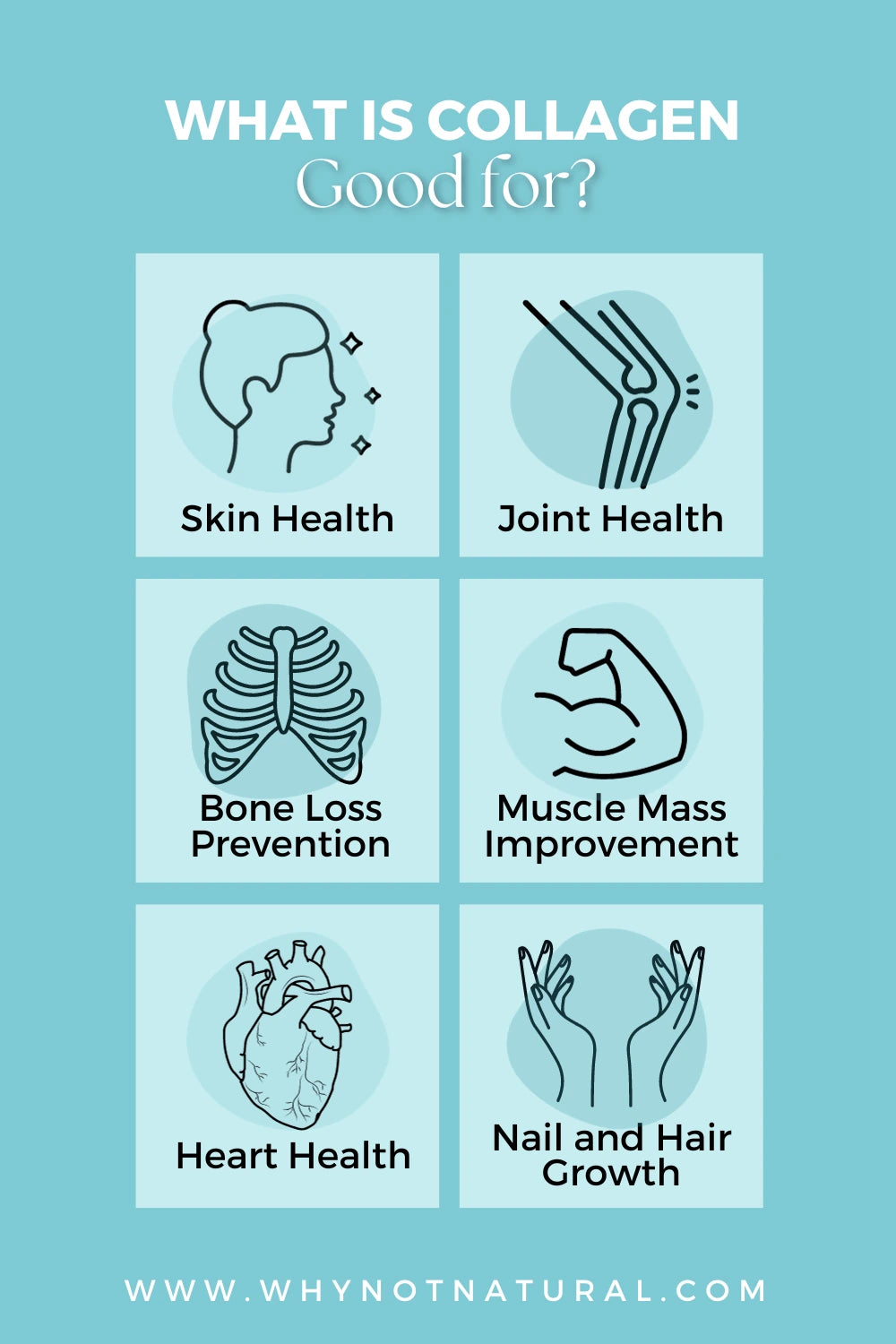

· By Kelin Marquet
What is Collagen Good For?
Collagen is the most abundant protein in the human body. It helps form connective tissues like skin, muscles, tendons, and ligaments. Think of it as the body’s built-in scaffolding, except you don’t need a construction permit for this one.
It provides structure to your skin. It cushions your joints. It contributes to bone strength. Natural collagen levels decline with age, so many people look for ways to support their collagen intake or production.
There are 28 known types of collagen. Four of them show up far more often than the rest.
The Four Main Types of Collagen
Type I
The most prevalent type, making up over 90% of the collagen in the body. It appears in nearly all connective tissue.
Type II
Found in cartilage, especially in joints and between vertebrae.
Type III
Found in the skin and blood vessels.
Type IV
Located in the basement membrane of the skin and in parts of the inner ear, kidneys, and eye lens.
Many collagen supplements contain a blend of collagen types, while others focus on one. Why Not Natural Liquid Collagen with Biotin contains Type I marine collagen. Marine collagen is hydrolyzed, meaning it is broken into smaller particles for easier absorption.
Collagen is also naturally present in foods like bone broth. A smaller amount comes from eating meats that contain connective tissue. Vegans and vegetarians don’t get collagen directly from plants, but the body can still synthesize collagen as long as it has the right building blocks. Vitamin C is crucial for this process.
Potential Benefits of Collagen Consumption
Research on collagen is growing. Many findings relate to the way collagen supports structures or processes in the body rather than treating or curing conditions.
Skin Health
Skin naturally becomes less elastic and firm over time because collagen production decreases. Collagen also plays a role in skin hydration.
Some studies have shown that oral collagen supplementation may support improvements in skin hydration and elasticity. One randomized, double-blind, controlled study found that 1,000 mg per day supported visible improvements in as little as six weeks. Another review of 11 studies reported promising short-term and long-term results in skin elasticity, hydration, and density at doses of 3 to 10 grams per day.
Joint Support
Collagen is found in cartilage, which cushions the joints. As we age, cartilage may naturally weaken. Some studies suggest collagen supplementation may support joint comfort and help maintain healthy joint function. A meta-analysis of five placebo-controlled studies reported that 10 grams of collagen per day supported improvements in self-reported joint stiffness and comfort.
Bone Support
Collagen contributes to bone structure. Research has shown that supplementing with collagen may support markers related to bone health. For example, a 12-month study of postmenopausal women taking 5 grams per day found positive changes in bone mineral density.
Muscle Mass
Collagen makes up roughly 10% of muscle tissue. In a 12-week study involving men with age-related muscle loss, those who supplemented with collagen during resistance training experienced more improvements in muscle mass and strength than those who trained without collagen.
Heart and Artery Structure
Arteries rely on collagen for structure. Some small studies suggest that collagen supplementation may support arterial flexibility and healthy cholesterol markers. One six-month study of healthy adults reported improvements in arterial stiffness and HDL levels with 16 grams of collagen per day.
Hair and Nail Support
Some people use collagen to support nail growth. One study with 25 participants found that 2.5 grams per day supported improvements in nail appearance and brittleness over 24 weeks. Research on hair is limited, but many experts theorize a similar supportive effect.
Other Areas
Some practitioners discuss collagen in relation to gut, brain, and weight-related wellness. At this time, research remains limited, so these topics require more investigation.
Liquid Marine Collagen + Biotin

